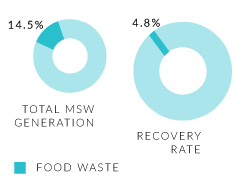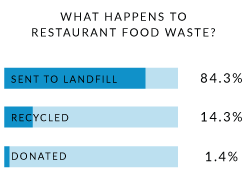According to the EPA, over 36 million tons of food waste reaches landfill every year in the United States. As food purveyors tasked with estimating consumer appetites, restaurants experience first-hand just how much food is wasted on a daily basis.
Luckily, many businesses in the food industry are putting their scraps to good use by composting, and the benefits of the organic process stretch beyond the environment and directly to their bottom line.
FOOD WASTE IS A GROWING PROBLEM IN THE U.S.

Did you know nearly 40% of food in the United States goes uneaten? This translates to millions of pounds of food being wasted every year and costing us hundreds of billions of dollars.
It's a problem for the waste industry, too. The EPA estimates that food is sent to landfill more than any other material. The graphs above highlight the estimated total MSW generated and recovered in 2012. Food waste accounted for 14.5% (or 36.43 million tons) of total MSW generated and had a 4.8% recovery rate (or 1.74 million tons). Food waste was recovered at a much lower rate than any other material that year.
How Do Restaurants Play A Part?
A lot of restaurant food goes uneaten every single day. An analysis from the Food Waste Reduction Alliance found that 84.3% of unused food in American restaurants ends up as trash, while 14.3% is recycled, and 1.4% is donated.

A paper from the Natural Resources Defense Council attributes losses in restaurants to large portions, inflexibility of chain-store management, and pressure to maintain enough food supply to offer extensive menu choices at all times.
HOW ARE RESTAURANTS AFFECTED BY FOOD LOSS?
Throwing large volumes of food away as trash means you probably have heavy, expensive waste containers that are serviced frequently. Businesses in the food service industry are also known for having contamination issues. When both weight and volume are trending high, chances are your business is probably spending a lot of money to send unused food to landfill.
A SOLUTION TO FOOD WASTE: COMPOSTING
While food loss negatively affects the restaurant-industry in many ways, there is a simple solution that is good for business, and the environment: composting.
The Green Restaurant Association claims that close to 95% of restaurants' waste could be recycled or composted! Instead of dealing with the expenses and hassles of hauling away mostly food waste to landfill, composting allows your restaurant to divert nearly all its waste! Composting turns your organics into valuable resources and doing this means you no longer needs to worry about high contamination, heavy dumpsters, and high waste costs. Not only is it good for business, but composting turns your organic waste into resources and truly closes the loop!
Monteverde restaurant in Chicago has found much success from their compost program. Co-owner and chef Sarah Grueneberg is quoted in the Chicago Tribune explaining, “We save all fruit and vegetable scraps, dairy, some meats, egg shells, cardboard, paper towels that aren’t bleached. Those can all go in the compost. If we didn’t compost, we’d probably need another dumpster that would just go to landfill…”
If you have any objections to composting, or think a program is too difficult to implement, check out our resource to discover our best tips & practices for businesses. It’s actually a lot easier than you may think.
